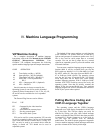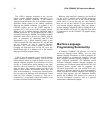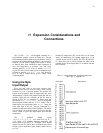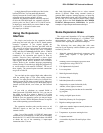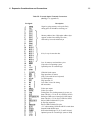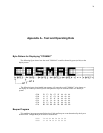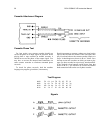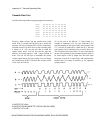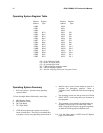VIL Troubleshooting Hints
This section is aimed at helping you diagnose and fix
hardware problems should they occur. First, check all
IC's to make sure they are properly inserted in the PC
card. An IC inserted in the wrong direction can be
permanently damaged. Check that the +5 V DC supply
voltage ripple does not exceed 0.2 volt. Visually inspect
the PC card for solder shorts or bad solder joints. Try to
avoid zapping your PC card with static electricity
charges. Discharge youself, if necessary, by touching a
grounded object before touching any IC's or PC card
wiring.
No Sound
If everything works but you don't hear any sound
from the speaker you probably have a bad U15, bad
speaker, or bad connection. Flip RUN up with key C
down. Hold any key down and the Q light should come
on. Check the Q line if it doesn't. The Q line should be at
+5 V with a key held. If the Q light is on, but with no
tone, check U15 and your speaker connections.
No Display
If you get no display but do get operating system key
tones, check the video output signal. First, select the
operating system to make sure video should be present.
The video signal should be 0.5 volt peak to peak or
higher. You should see negative-going vertical and
horizontal sync pulses and positive-going video pulses.
The sync pulses should be about 25% of the total swing.
Check your display system and interconnections if you
have the video signal present. Make sure you are using
the correct high-impedance input setting, for example.
Other Problems
27
Using operating system mode 0, load bytes into RAM
using all 16 hex keys. If a key doesn't work or shows the
wrong value on the display screen, check the keyboard
and U13.
If everything except the cassette interface works,
check U14. Review the cassette recording guidelines in
Appendix A. Use the cassette phase and data test
procedures described in Appendix A to find out what's
wrong.
If you can run some programs but not others, you
may have a bad RAM bit. Load and use the memory test
program provided in Appendix A. Try changing RAM
chips, one at a time.
If nothing seems to work and you can't run the
operating system, check your power supply and PC card
wiring for shorts again. If everything still seems OK you
will have to start signal tracing.
Signal Tracing
Check the U3 oscillator output. If not present, replace
U3. If the 3.521280-MHz signal is present, check the U4
divider. Replace U4 if it isn't toggling. Make sure you
use a 7474 type. With RUN up, you should see TPA and
TPB pulses being generated at pins 33 and 34 of U1 If
they are not present, check the RUN level to make sure
the switch is working, then replace U1.
Check the output of U6B to make sure that the ROM
is initially selected when RUN is first flipped



